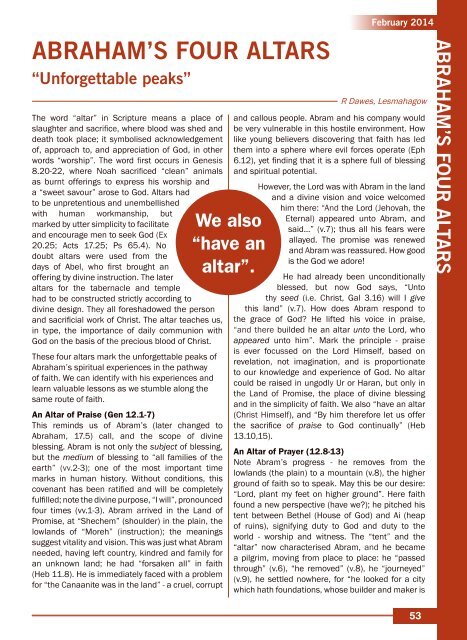You also want an ePaper? Increase the reach of your titles
YUMPU automatically turns print PDFs into web optimized ePapers that Google loves.
ABRAHAM’S FOUR ALTARS<br />
“Unforgettable peaks”<br />
The word “altar” in Scripture means a place of<br />
slaughter and sacrifice, where blood was shed and<br />
death took place; it symbolised acknowledgement<br />
of, approach to, and appreciation of God, in other<br />
words “worship”. The word first occurs in Genesis<br />
8.20-22, where Noah sacrificed “clean” animals<br />
as burnt offerings to express his worship and<br />
a “sweet savour” arose to God. Altars had<br />
to be unpretentious and unembellished<br />
with human workmanship, but<br />
marked by utter simplicity to facilitate<br />
and encourage men to seek God (Ex<br />
20.25; Acts 17.25; Ps 65.4). No<br />
doubt altars were used from the<br />
days of Abel, who first brought an<br />
offering by divine instruction. The later<br />
altars for the tabernacle and temple<br />
had to be constructed strictly according to<br />
divine design. They all foreshadowed the person<br />
and sacrificial work of Christ. The altar teaches us,<br />
in type, the importance of daily communion with<br />
God on the basis of the precious blood of Christ.<br />
These four altars mark the unforgettable peaks of<br />
Abraham’s spiritual experiences in the pathway<br />
of faith. We can identify with his experiences and<br />
learn valuable lessons as we stumble along the<br />
same route of faith.<br />
An Altar of Praise (Gen 12.1-7)<br />
This reminds us of Abram’s (later changed to<br />
Abraham, 17.5) call, and the scope of divine<br />
blessing. Abram is not only the subject of blessing,<br />
but the medium of blessing to “all families of the<br />
earth” (vv.2-3); one of the most important time<br />
marks in human history. Without conditions, this<br />
covenant has been ratified and will be completely<br />
fulfilled; note the divine purpose, “I will”, pronounced<br />
four times (vv.1-3). Abram arrived in the Land of<br />
Promise, at “Shechem” (shoulder) in the plain, the<br />
lowlands of “Moreh” (instruction); the meanings<br />
suggest vitality and vision. This was just what Abram<br />
needed, having left country, kindred and family for<br />
an unknown land; he had “forsaken all” in faith<br />
(Heb 11.8). He is immediately faced with a problem<br />
for “the Canaanite was in the land” - a cruel, corrupt<br />
We also<br />
“have an<br />
altar”.<br />
<strong>February</strong> 2014<br />
R Dawes, Lesmahagow<br />
and callous people. Abram and his company would<br />
be very vulnerable in this hostile environment. How<br />
like young believers discovering that faith has led<br />
them into a sphere where evil forces operate (Eph<br />
6.12), yet finding that it is a sphere full of blessing<br />
and spiritual potential.<br />
However, the Lord was with Abram in the land<br />
and a divine vision and voice welcomed<br />
him there: “And the Lord (Jehovah, the<br />
Eternal) appeared unto Abram, and<br />
said…” (v.7); thus all his fears were<br />
allayed. The promise was renewed<br />
and Abram was reassured. How good<br />
is the God we adore!<br />
He had already been unconditionally<br />
blessed, but now God says, “Unto<br />
thy seed (i.e. Christ, Gal 3.16) will I give<br />
this land” (v.7). How does Abram respond to<br />
the grace of God? He lifted his voice in praise,<br />
“and there builded he an altar unto the Lord, who<br />
appeared unto him”. Mark the principle - praise<br />
is ever focussed on the Lord Himself, based on<br />
revelation, not imagination, and is proportionate<br />
to our knowledge and experience of God. No altar<br />
could be raised in ungodly Ur or Haran, but only in<br />
the Land of Promise, the place of divine blessing<br />
and in the simplicity of faith. We also “have an altar<br />
(Christ Himself), and “By him therefore let us offer<br />
the sacrifice of praise to God continually” (Heb<br />
13.10,15).<br />
An Altar of Prayer (12.8-13)<br />
Note Abram’s progress - he removes from the<br />
lowlands (the plain) to a mountain (v.8), the higher<br />
ground of faith so to speak. May this be our desire:<br />
“Lord, plant my feet on higher ground”. Here faith<br />
found a new perspective (have we?); he pitched his<br />
tent between Bethel (House of God) and Ai (heap<br />
of ruins), signifying duty to God and duty to the<br />
world - worship and witness. The “tent” and the<br />
“altar” now characterised Abram, and he became<br />
a pilgrim, moving from place to place: he “passed<br />
through” (v.6), “he removed” (v.8), he “journeyed”<br />
(v.9), he settled nowhere, for “he looked for a city<br />
which hath foundations, whose builder and maker is<br />
ABRAHAM’S FOUR ALTARS<br />
53


